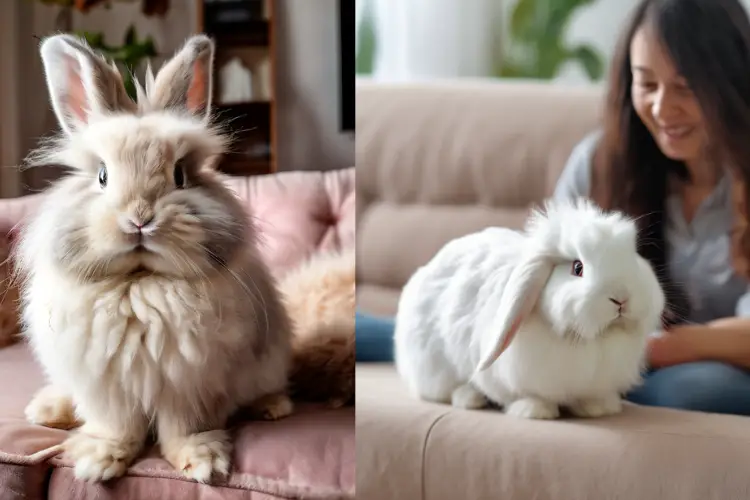Angora rabbits are a distinct breed known for their incredibly soft and luxurious wool coats. These furry companions have captured the hearts of rabbit enthusiasts worldwide, not only for their adorable appearance but also for their gentle temperament and fascinating history.
In this blog post guide, we’ll delve into the captivating world of Angora rabbits, exploring their unique characteristics, grooming needs, and the rich heritage that surrounds this beloved breed.
A Brief History of Angora Rabbits
The origins of Angora rabbits can be traced back to the ancient city of Angora (now known as Ankara), located in modern-day Turkey. It is believed that these rabbits were first bred in this region during the 18th century for their highly prized wool, which was used to create intricate and valuable textiles.
Over time, the popularity of Angora rabbits spread throughout Europe and eventually to other parts of the world. Breeders selectively bred these rabbits to refine their wool quality and enhance their distinctive physical characteristics, giving rise to the various Angora rabbit varieties we know today.
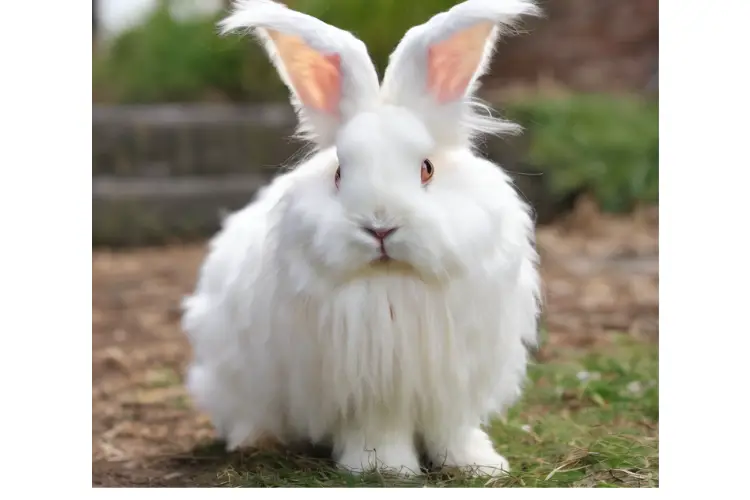
Physical Characteristics of Angora Rabbits
Angora rabbits are renowned for their striking appearance, which is primarily defined by their remarkable wool coats. Here are some of the key physical characteristics that distinguish these fluffy companions:
Wool Coat
- Texture: The defining feature of Angora rabbits is their incredibly soft and silky wool coat. The fibers are long, thin, and delicate, lending a luxurious feel to their fur.
- Length: Angora rabbits have long, flowing wool that can grow up to several inches in length. Regular grooming and trimming are necessary to prevent matting and maintain the coat’s health.
- Colors: Angora rabbits come in a variety of colors, including white, black, blue, chocolate, and various shades of gray. Some individuals may also display unique color patterns or markings.
Body Structure
- Size: Angora rabbits are typically medium-sized, with an average weight ranging from 5 to 9 pounds (2.3 to 4.1 kg).
- Build: They have a sturdy and muscular build, with a broad head and a compact body shape.
- Ears: Angora rabbits possess distinctive, upright ears that are well-furred and contribute to their adorable appearance.
Grooming Needs
While the luxurious wool coat of Angora rabbits is undoubtedly one of their most attractive features, it also requires consistent grooming to maintain its health and prevent matting. Here are some essential grooming tips for Angora rabbit owners:
- Brushing: Daily brushing with a slicker brush or wide-toothed comb is necessary to remove loose hair and prevent tangles or mats from forming.
- Trimming: Regular trimming of the wool, especially around the hindquarters and feet, is recommended to prevent soiling and potential health issues.
- Bathing: Occasional bathing with a gentle, rabbit-safe shampoo can help keep the coat clean and free from debris.
- Nail Trimming: Keeping their nails trimmed is important for their comfort and to prevent accidental scratches during grooming sessions.
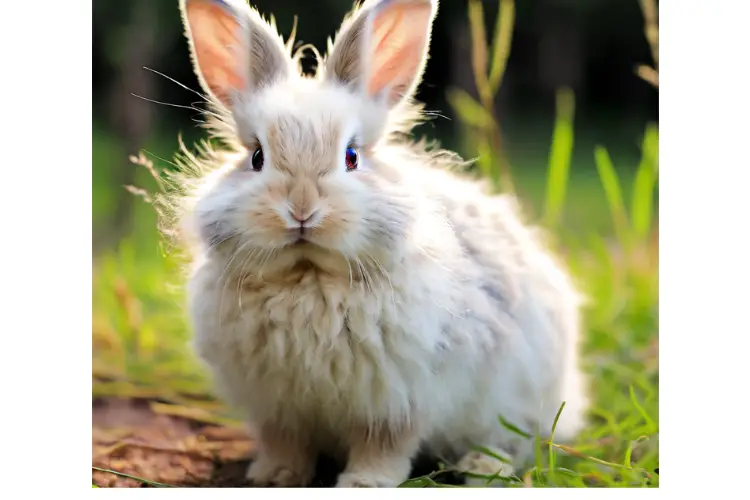
Temperament and Personality
Beyond their striking appearance, Angora rabbits are known for their gentle and affectionate personalities. These docile creatures make wonderful companions for families and individuals who are willing to provide the necessary care and attention they require.
Here are some key traits that define the temperament of Angora rabbits:
- Friendly: Angora rabbits are generally friendly and sociable, especially when properly socialized from a young age. They enjoy human interaction and can form strong bonds with their owners.
- Calm: These rabbits have a calm and relaxed demeanor, making them suitable for indoor living and interaction with children (under supervision).
- Intelligent: Angora rabbits are intelligent and can be trained to perform simple tricks or behaviors, such as litter box training, with patience and positive reinforcement.
- Curious: Like many rabbits, Angoras are naturally curious and enjoy exploring their surroundings. Providing them with a safe and enriching environment is essential for their mental well-being.
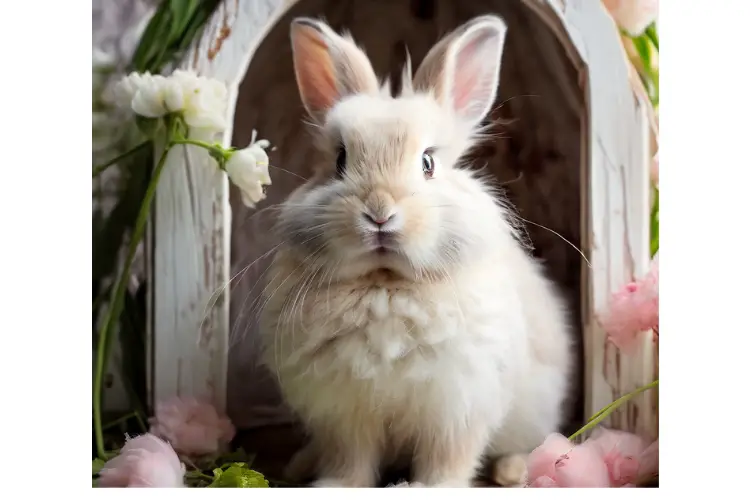
Caring for Angora Rabbits
Owning an Angora rabbit is a rewarding experience, but it also requires a commitment to providing proper care and meeting their specific needs. Here are some important considerations for caring for Angora rabbits:
Housing
- Spacious Enclosure: Angora rabbits require a spacious enclosure or rabbit-proofed room to allow for ample space to move around, exercise, and engage in natural behaviors.
- Proper Flooring: Solid, non-slip flooring, such as tile or rabbit-safe mats, is recommended to prevent wool accumulation and potential health issues.
- Hiding Spots: Provide plenty of hiding spots and cozy areas for your Angora rabbit to feel secure and comfortable.
Diet
- Hay: A high-quality, unlimited supply of hay (timothy or orchard grass) should make up the bulk of an Angora rabbit’s diet, as it aids in proper digestion and dental health.
- Fresh Vegetables: Offer a variety of fresh vegetables, such as leafy greens, carrots, and bell peppers, for essential nutrients and fiber.
- Pellets: A small amount of high-fiber, timothy hay-based pellets can supplement their diet, but should not be the primary food source.
- Fresh Water: Always provide access to clean, fresh water to ensure proper hydration.
Health Considerations
Like all rabbits, Angora rabbits have specific health considerations that owners should be aware of:
- Wool Block: Due to their excessive wool production, Angora rabbits are prone to developing wool blocks or hairballs, which can cause digestive issues. Regular grooming and hay intake can help prevent this.
- Dental Issues: Proper diet and hay intake are crucial to maintain good dental health and prevent overgrown teeth, a common issue in rabbits.
- Heat Stress: Angora rabbits can be sensitive to heat due to their thick wool coats. Providing a cool, well-ventilated environment and access to shade or air conditioning is essential during warmer months.
- Regular Veterinary Care: Annual check-ups and regular grooming sessions with a qualified rabbit-savvy veterinarian are recommended to ensure your Angora rabbit’s overall health and well-being.
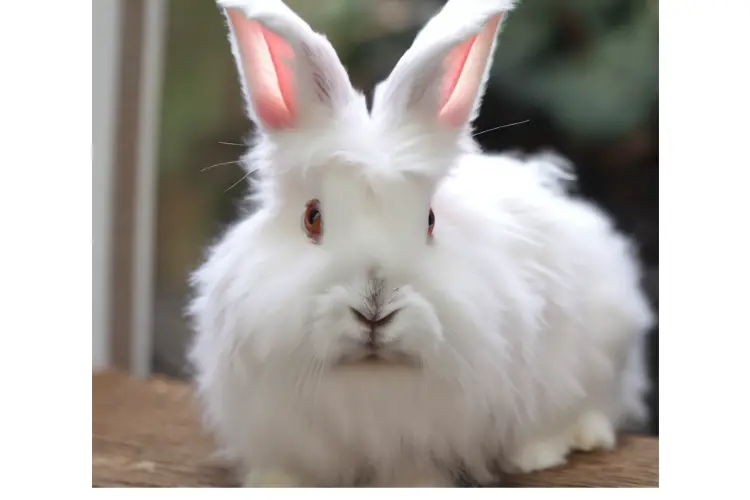
Angora Rabbit Varieties
While all Angora rabbits share the distinctive trait of their luxurious wool coats, there are several recognized varieties within the breed. Here’s a table highlighting some of the most popular Angora rabbit varieties:
| Variety | Description |
|---|---|
| English Angora | One of the largest Angora varieties, with a dense and silky wool coat. Colors include white, black, blue, and various shades of gray. |
| French Angora | A smaller variety with a finer and more delicate wool texture. Often seen in white, but other colors are also accepted. |
| Giant Angora | As the name suggests, this variety is the largest of the Angora rabbits, with a massive, dense wool coat and a calm temperament. |
| Satin Angora | A unique variety with a distinct sheen and luster to their wool coat, resulting from a gene that affects the fiber structure. |
| German Angora | Recognized for their dense, wool coats and compact body structure. Various color varieties are accepted. |
Each variety has its own unique characteristics and may be better suited for certain purposes, such as wool production or exhibition. Responsible breeders and rabbit organizations can provide valuable guidance in choosing the right Angora variety for your needs and preferences.
Conclusion
Angora rabbits are truly remarkable creatures, captivating both with their stunning appearance and their gentle, affectionate personalities. From their luxurious wool coats to their rich history, these rabbits offer a unique and rewarding experience for those willing to provide the necessary care and attention they require.
Whether you’re a seasoned rabbit enthusiast or considering adding an Angora rabbit to your family, understanding their unique characteristics and specific needs is crucial. By embracing their grooming requirements, providing a suitable living environment, and ensuring proper diet and health care, you can ensure a happy and fulfilling life for your fluffy companion.
Angora rabbits are not just pets; they are living embodiments of a centuries-old tradition, weaving together beauty, gentleness, and a connection to our

